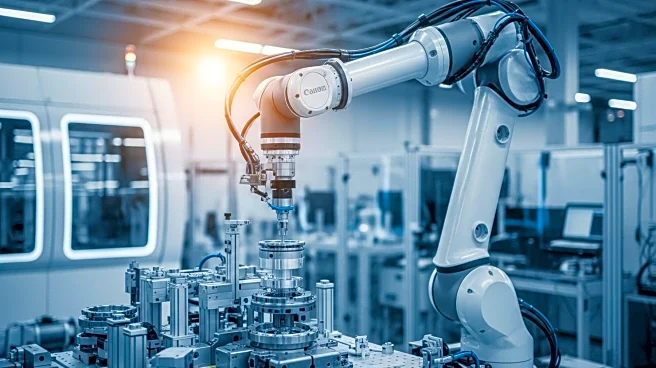What's Happening?
Liebherr Gear & Automation Technologies, Inc., a company specializing in factory automation systems, is spotlighting the role of automation in manufacturing through the experiences of Justin Mayville, a Regional Sales Manager. Based in Dexter, Michigan, Mayville identifies opportunities for factory automation and provides solutions for North American manufacturers. His role involves traveling to various manufacturing operations to enhance profitability and productivity through automation. Mayville's career in manufacturing is driven by a passion for contributing to processes that advance societal evolution. He emphasizes the importance of continuous learning and adapting to industry changes, advising young people to start early and master their craft.
Why It's Important?
The focus on manufacturing automation is significant as it represents a shift towards more efficient and productive manufacturing processes. Automation can lead to increased profitability for manufacturers and contribute to the overall advancement of the industry. By highlighting the experiences of professionals like Mayville, the industry can inspire the next generation to pursue careers in manufacturing, addressing potential skill shortages. The emphasis on education and adaptation to new technologies is crucial as the industry evolves, ensuring that the workforce remains competitive and capable of meeting future challenges.
What's Next?
To increase interest in manufacturing careers among young people, manufacturers are encouraged to make factory work appealing through the integration of new technologies and upgrades. Investing in the future workforce by promoting inclusivity and continuous education can help attract talent to the industry. As automation becomes more prevalent, companies like Liebherr Gear & Automation Technologies will likely continue to play a pivotal role in shaping the future of manufacturing.
Beyond the Headlines
The push for automation in manufacturing also raises questions about the future of the workforce and the skills required to thrive in an increasingly automated environment. There is a need for educational institutions and industry leaders to collaborate in developing training programs that equip workers with the necessary skills. Additionally, the ethical implications of automation, such as job displacement, must be addressed to ensure a balanced approach to technological advancement.









